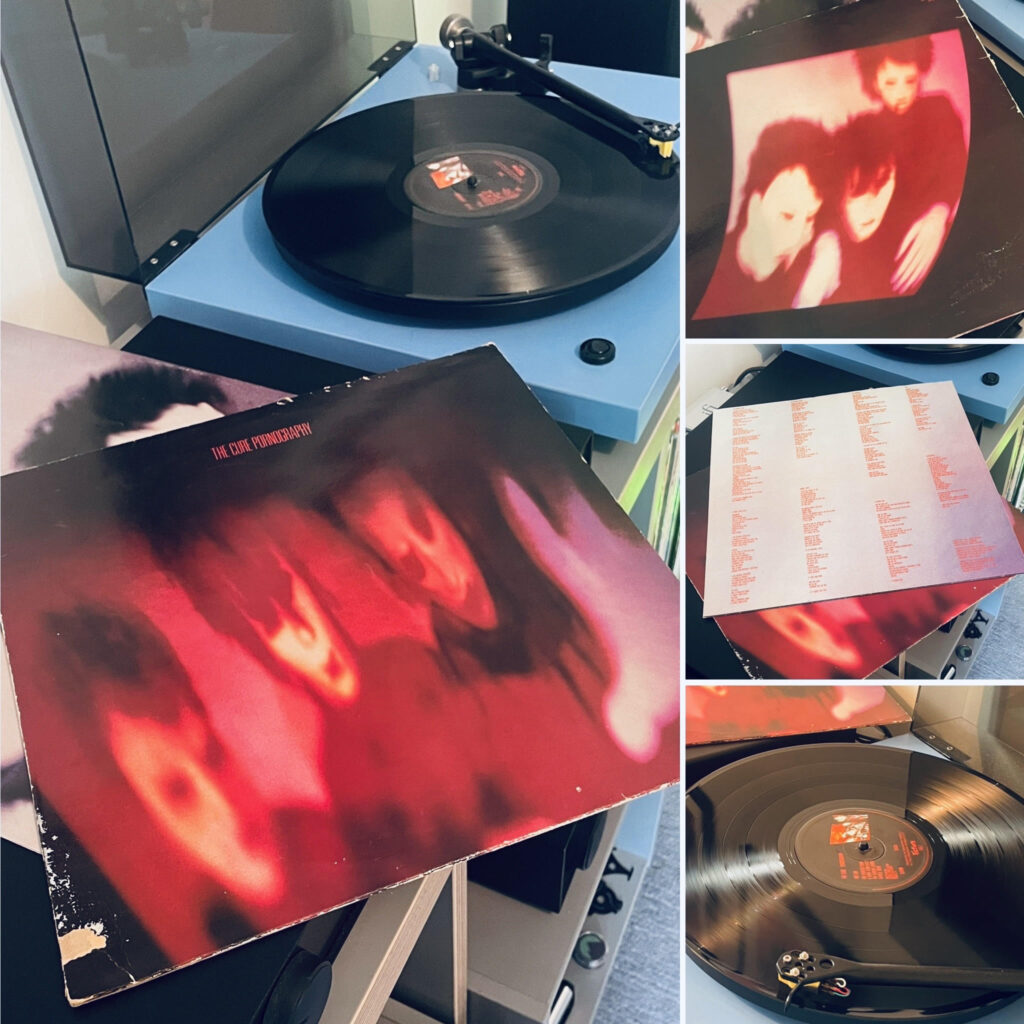Four decades on, Robert Smith’s darkest hour remains a towering monolith of despair

The year is 1982. A pre-Falklands War Thatcher’s Britain is strangling itself, unemployment queues stretch round the block, at RAK studios – the production home of Mickie Most… a mentally exhausted The Cure trio including an actually suicidal Robert Smith are busy raiding the local off-licence and dropping LSD while constructing Pornography. An album set to be a valedictory, instead the fourth of many but in retrospect the most unforgiving album in their catalogue. This is not a weeping song, it’s a weeping album of relentless despair deep in the trenches. I’m trying to think of more angst ridden vinyl before this, Leonard Cohen? he doesn’t touch the sides.
To pin down Pornography’s genre is like trying to nail jelly to the wall blindfolded. Is it goth? Well, it certainly helped birth the movement, though Smith and co. were likely too busy drowning in their own existential mire to notice they were creating a blueprint for a thousand even paler imitators. Post-punk seems closer to the mark, the album shares DNA with the abrasive experimentation of Wire and the introverted intensity of Joy Division, yet it possesses a peculiar self aware grandiosity that sometimes flirts with progressive rock’s theatrical impulses.
The opener, “One Hundred Years,” remains one of the most genuinely unsettling pieces of music committed to vinyl as confirmed by a thousand other reviews over the decades. Simon Gallup’s bass doesn’t so much play as it lurches, each note feeling like a death rattle echoing through a Victorian mausoleum. Lol Tolhurst’s drums don’t keep time, they mark the countdown to apocalypse with Swiss precision. Over it all, Smith’s open but discordant guitar work writhes and contorts like something in its final death throes, whilst his vocals deliver pronouncements of doom with the authority of a biblical prophet having a particularly bad day, ‘Stroking your hair while the patriots are shot’. Cheery.
Smith’s lyrics here read like dispatches from a post-nuclear wasteland, all “caressing an old man” and visions of flesh rotting in slow motion. “It doesn’t matter if we all die,” he intones with the casual indifference of someone reading the shipping forecast, before launching into imagery that makes JG Ballard’s crash fetishists seem positively life-affirming. The repeated invocation of “ambition” becomes less a call to achievement than a bitter mockery of human striving in the face of inevitable decay. It’s dystopian poetry delivered with the matter-of-fact brutality that only someone contemporaneously truly acquainted with despair could muster.
The album’s themes are hardly subtle. Death, execution, decay, sexual obsession, and psychological collapse aren’t just lyrical preoccupations here, they’re the very fabric from which the music is woven. The title track itself is a gruelling eight-minute descent into total madness.
What’s remarkable, and this is an album that has needed the space of time to fully appreciate – but listening back now, is how individual virtuosity serves the album’s suffocating atmosphere rather than showing off for its own sake. A polar opposite of prog. Gallup’s bass playing is masterful, his lines on “The Hanging Garden” provide both melodic anchor and rhythmic propulsion whilst never losing sight of the song’s essential bleakness. Lol Tolhurst, soon to eschew drums for keyboards, proves his worth with drumming that’s both primitive and sophisticated, knowing precisely when to pummel and when to restrain.
You’re drawn into the narrative so deeply that by the time The Hanging Garden begins the assumption is hung as in executed, then you think well, The Hanging Gardens of Babylon were decorative – but by the end you’re covering your face as the animals die. Oh well.
Pornography exists in its own ecosystem, hermetically sealed from the outside world. It’s an album that doesn’t court your affection so much as dare you to spend time in its company. The fact that it spawned a thousand goth clubs and launched a million black-clad disciples is almost beside the point, this is music that transcends subcultural boundaries through sheer force of vision.
Four decades later, as Britain – indeed the world once again finds itself wrestling with its demons, Pornography sounds less like a relic of its time and more like a prophetic statement. It remains The Cure’s most uncompromising work, a 43-minute journey into the abyss that somehow manages to be simultaneously utterly miserable and strangely life-affirming. A album that could leave you with a thousand yard stare. Give me your eyes that I might see, a blind man kissing my hand.
Essential listening, but if you’ve just begun a course of anti-depressants read the side effects first.